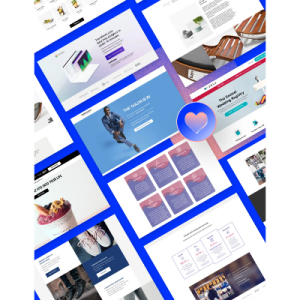What is a Corporate Website?
At its core, a corporate website serves as the official online representation of a company. Unlike an e-commerce site focused solely on sales, a corporate website encompasses a broader range of functions, aiming to inform, engage, and build relationships with a diverse audience of stakeholders. This includes:
- Prospective and existing customers: Providing detailed information about products, services, and solutions.
- Investors and shareholders: Offering financial reports, corporate governance details, and news releases.
- Potential employees: Showcasing company culture, career opportunities, and employee benefits.
- Media and press: Serving as a hub for press kits, media contacts, and corporate announcements.
- Partners and suppliers: Facilitating communication and collaboration.
Key Features of an Effective Corporate Website:
A well-executed corporate website is characterized by a blend of essential elements that contribute to its overall effectiveness:
- Clear and Consistent Branding: The website must visually reflect the company’s brand identity, including logos, color schemes, typography, and imagery. Consistency across all digital touchpoints builds recognition and reinforces brand values.
- Intuitive Navigation and User Experience (UX): Visitors should be able to find information quickly and effortlessly. Clear menus, a logical site structure, and a search function are crucial for a positive user experience.
- Comprehensive “About Us” Section: This section tells the company’s story, including its mission, vision, values, history, leadership team, and achievements. It humanizes the brand and builds trust.
- Detailed Products/Services Pages: Clearly outlining offerings with descriptions, specifications, benefits, and relevant visuals. For service-based businesses, this might include case studies and client testimonials.
- Contact Information and Forms: Easy-to-find contact details (phone, email, address) and interactive contact forms are essential for inquiries and customer support.
- Newsroom/Blog: A dynamic section for company news, press releases, industry insights, thought leadership articles, and other relevant content. This enhances SEO and positions the company as an authority.
- Careers/Recruitment Section: For larger organizations, a dedicated careers page attracts talent by showcasing open positions, company culture, and employee benefits.
- Investor Relations (for public companies): Providing financial data, annual reports, SEC filings, and investor presentations to meet regulatory requirements and keep shareholders informed.
- Responsive Design: Ensuring the website adapts seamlessly to various screen sizes (desktops, tablets, smartphones) is critical for accessibility and user satisfaction.
- Security: Robust security measures, including SSL certificates and secure data handling, are paramount to protect sensitive information and maintain user trust.
- Calls to Action (CTAs): Guiding visitors toward desired actions, whether it’s downloading a white paper, requesting a demo, or subscribing to a newsletter.
- SEO Optimization: Implementing search engine optimization best practices to ensure the website ranks highly in search engine results, driving organic traffic.
- Analytics Integration: Tools for tracking website traffic, user behavior, and engagement metrics provide valuable insights for continuous improvement.
The Undeniable Benefits:
The advantages of a well-designed corporate website are multifaceted:
- Enhanced Credibility and Trust: A professional online presence instantly establishes legitimacy and trustworthiness, a critical factor for both potential customers and business partners.
- 24/7 Accessibility and Global Reach: The website operates around the clock, transcending geographical boundaries and allowing businesses to connect with audiences worldwide, regardless of time zones.
- Improved Communication and Information Dissemination: It serves as a central hub for sharing important company updates, product information, and thought leadership, ensuring consistent messaging.
- Lead Generation and Sales Support: While not solely e-commerce focused, a corporate website can effectively generate leads through contact forms, content downloads, and calls to action, supporting the sales funnel.
- Brand Building and Awareness: The website provides a platform to articulate the company’s unique selling propositions, values, and brand personality, contributing to strong brand recognition.
- Cost-Effective Marketing: Compared to traditional advertising, a website offers a highly cost-effective platform for ongoing marketing and communication efforts.
- Competitive Advantage: In today’s digital landscape, businesses without a strong online presence risk being overlooked by competitors who are actively engaging their audience online.
- Customer Service Enhancement: FAQs, support portals, and contact options on the website can significantly improve customer service efficiency and satisfaction.
- Recruitment and Talent Acquisition: A well-designed careers section can attract top talent by showcasing the company as an appealing employer.
Conclusion:
A corporate website is no longer a luxury but a fundamental necessity for any business aiming for long-term success. It acts as a powerful communication tool, a global shop window, and a vital component of a comprehensive digital strategy. Investing in a well-planned, user-centric, and technically sound corporate website is an investment in the future and sustained growth of your business





There are no reviews yet.